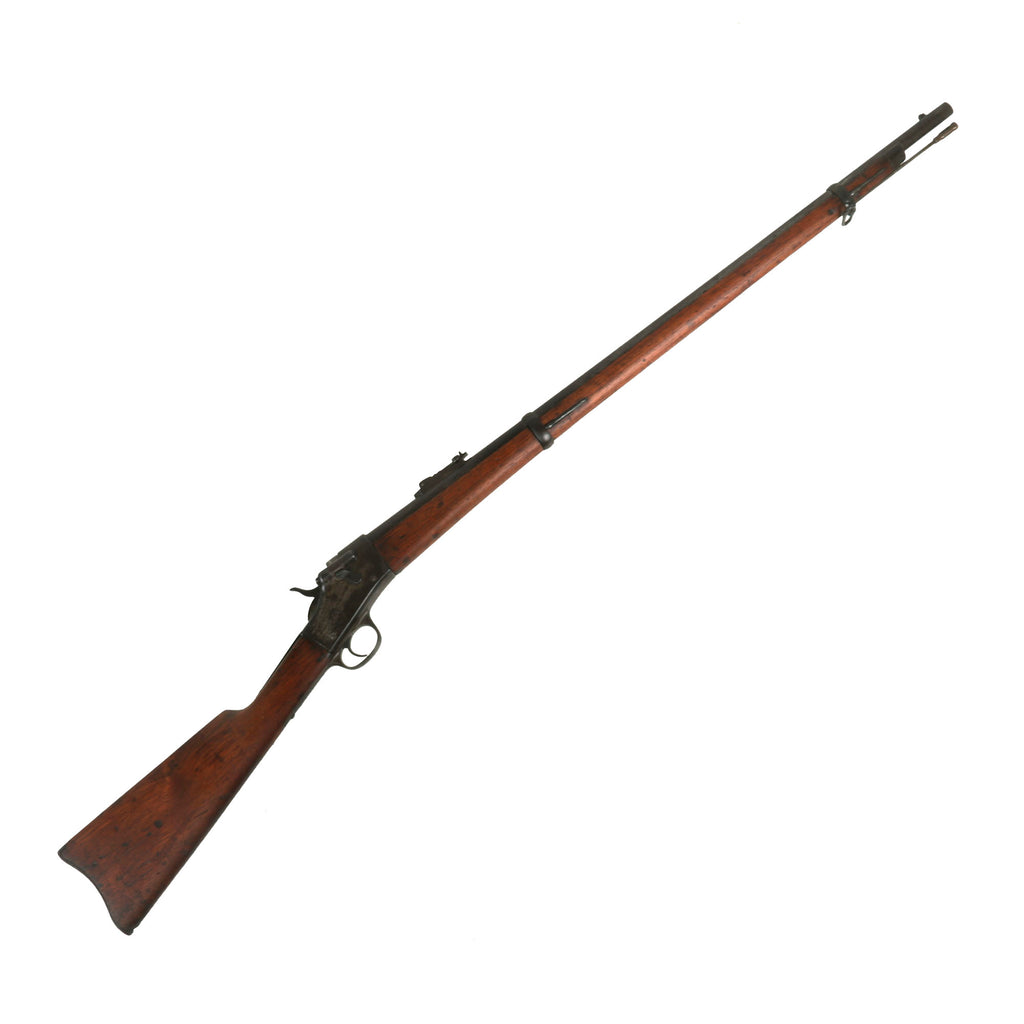Item Description
Original Item: Only One available. Now this is a rare bird, the first example that we have ever had! This is a very nice example of a rare Whitney "Phoenix" rifle, somewhat similar in form to a Remington rolling block, but in this case the bridge is hinged and opens to the right, similar in some ways to a Snider or Joslin type system, but much more refined. There were various hunting rifles made using this system, but also some full-stocked military rifles as well. According to Flayderman’s Guide to Antique American Firearms only about 15,000 of these rifles were produced in period 1867-1881 with the majority produced for the Central & South American markets. A few were sold to State Militias, and this is most likely one of those examples.
From what we can tell, most of the export models were chambered in the somewhat ubiquitous .43 Spanish, however this example is marked 45 CAL. 70GR., indicating chambering for .45-70 government. Only rifles intended for domestic use were made in this chambering. It is marked with serial number 5074 on the trigger guard as well as the underside of the rotating breech. The only other markings are the standard U.S. proof marks of the mid-late 19th century on the left side of the barrel: V / P / Eagle's Head. The two barrel bands are also both U marked. We were not able to see any other markings on the rifle, and from what we can tell, the military rifles usually had minimal markings.
The rifle is in very good service used condition, with a lovely worn patina overall. The metalwork has matured to an oxidized peppery patina, with no major rust issues that we can see. The breech opens correctly, with the ejector presenting when it is pushed farther to the right, though due to wear on the breech block the locking tab does not hold it securely closed anymore. The firing pin is still present, but will get stuck in the forward position if the rifle is dry fired. The hammer pulls back and locks correctly, with no issues noted. The bore is in very good condition, showing clear lands and grooves with a bright finish. There is just a bit of wear and fouling, with some darker areas near the muzzle.
The American black walnut stocks are lovely, showing a great red brown color from years of age and oiling. There are a few small repairs on the butt stock near the hammer, but otherwise they are in solid condition, with no major cracks or other damage. The rifle has a front sling swivel on the barrel band, however there is not any rear sling swivel. We do not know if this was some type of trials rifle, or whether it was removed. It still has an original cleaning rod under the barrel, with intact threads, which threads into the stock correctly.
A lovely example of a very hard to find U.S. Military Single Shot rifle, ready to research and display!
Specifications:-
Years of Manufacture: 1867-1881
Caliber: .45-70 Government
Cartridge Type: Centerfire Cartridge
Barrel Length: 32 1/2 Inches
Overall Length: 48 Inches
Action type: Hinged Breechblock with side action lock.
Feed System: Single Shot
More on Eli Whitney and the Whitney-ville Armory:
The musket was a product of Eli Whitney’s firm which he called the “Whitneyville-Armory”, a production facility founded in Connecticut circa 1850-70. The factory and town of "Whitneyville", today near Hamden Connecticut, was so named due to its association with the famous Eli Whitney, the inventor of the Cotton Gin. Whitney also manufactured firearms, such as Springfield Muskets, and his son, also named Eli Whitney, followed in his footsteps. The factory was expanded, and the area became known as "Whitneyville", making firearms throughout the 19th century.
From a modest factory complex straddling the Mill River just North of New Haven, Connecticut, the Whitney Armory produced more long-arms prior to and during the Civil War than any other private domestic manufacturer. From available records, it appears that the Whitney Armory turned out approximately 141,620 shoulder arms between 1826 and 1865. Furthermore, the variety of arms made was unsurpassed, even when compared to the National Armories. Most if not all of the Whitney long arms of this period found their way into the hands of Union and Confederate soldiers.
From the first government contract in 1798 through the Civil War, Whitney Armory had a steady flow of government work. Between 1826 and 1839, they made 39,000 M1816/22 flintlock muskets, most of which were subsequently converted to percussion. In addition, at least 2,000 more were made directly under state contracts. When the 1841 US Rifle was adopted, Whitney, then under the leadership of Eli Whitney, Jr., received orders totaling 26,500, between 1843 and 1855. They made another 600 with M1855 long-range sights and 420 more for Ohio using parts left over from the US contracts.
Ever creative and practical, Whitney was a master at taking parts discarded by others and incorporating them into serviceable weapons. With the advent of the Civil War, and during the months leading up to the conflict, several unusual models of long arms were made using parts from other sources, such as the US Armory at Springfield and the defunct Robbins and Lawrence operation in Windsor, Vermont. One model closely resembled the US M1855 Rifle-musket, using M1855 lock-plates from Springfield. Only 350 were made and all appear to have been sold to the State of Connecticut around 1861. Around this time, Whitney also made a completely different model which strongly resembled the P53 British Enfield Rifle-musket. This unique arm was made largely from surplus P53 Enfield parts left over from Robbins and Lawrence’s failed Crimean War contract with British government. It is estimated that 3,500 were made and sold to State governments, with 2,000 going to Maryland, 1,225 going to Georgia and 75 to Mississippi in the months just prior to the war. Other arms made in small quantities during this time included 750 Enfield style two-band rifles and 100 M1855 US style two-band rifles. Despite his New England blue-blood roots, Eli Whitney, Jr. apparently had no qualms about selling arms to Southern states on the eve of the Civil War. Of course, in fairness, the Southern states were still part of the Union at the time, so there was no legal reason to deny them arms.
Once the war commenced in earnest, Whitney dedicated almost all of its arms production to the manufacture of arms for the Federal Government and the State of Connecticut. Although Whitney was awarded a contract to make 40,000 US M1861 Rifle-muskets in 1861, he instead chose to proceed with his Connecticut contracts and the M1861 US Navy Plymouth Rifle. In late 1861, the State of Connecticut, taking advantage of its resident gun-maker, bought 6,000 rifle-muskets closely following the M1861 pattern, but not quite to Government specs. In 1862, Connecticut purchased an additional 8,000 rifle-muskets. In addition about 200 rifle-muskets with “humpback” locks, but conforming in all other ways to the Connecticut contracts, and probably bought by Connecticut, were made around this time. Around 1863, Whitney also made approximately 1,200 to 2,000 M1861 Rifle-muskets with extra parts from the Connecticut contract guns and marked them with the name “Manton,” an English gunmaker. Like the Connecticut guns, these Manton rifle-muskets did not meet government specifications, but were serviceable arms.
The factory, today near Hamden Connecticut, was so named due to its association with the famous Eli Whitney, the inventor of the Cotton Gin. Whitney also manufactured firearms, such as Springfield Muskets, and his son, also named Eli Whitney, followed in his footsteps. The factory was expanded, and the area became known as "Whitneyville", making firearms throughout the 19th century. Eventually, after several consolidations, the factory became "Whitneyville Armory."
NOTE: This gun is NOT considered obsolete calibre, so we are not able to ship to the United Kingdom. Please note that for international shipping, these MUST be shipped using UPS WW Services. International customers should always consult their country's antique gun laws prior to ordering.
- This product is not available for shipping in US state(s): New Jersey
This product is available for international shipping. Shipping not available to: United Kingdom
Note: This gun is NOT considered obsolete calibre, so we are no able to ship to the United Kingdom.
IMA considers all of our antique guns as non-firing, inoperable and/or inert. Title 18, U.S. Code, Section 921(a)(16) defines antique firearms as all guns made prior to 1899. This law exempts antique firearms from any form of gun control or special engineering because they are not legally considered firearms. No FFL, C&R or any license is required to possess, transport, sell or trade Antique guns. All rifles and muskets sold by IMA that were manufactured prior to 1899 are considered Antiques by the US BATF (United States Bureau of Alcohol, Tobacco & Firearms). Therefore, all of IMA's Antique guns may be shipped to all US States and most nations around the world.
These antique guns are not sold in "live" condition, and are not tested for the the ability to feed or load any type of cartridge. They are sold as collector's items or as "wall hangers" not for use, and we make no guarantees regarding functionality aside from what is stated in the description. Any attempt at restoring an antique gun to be operational is strongly discouraged and is done so at the risk of the customer. By purchasing an antique gun from IMA you thereby release IMA, its employees and corporate officers from any and all liability associated with use of our Antique guns.
Pre-1899 Manufacture, no licenses required, allowed to ship to almost any deliverable address across the globe. Please note that for international shipping, these MUST be shipped using UPS WW Services. International customers should always consult their country's antique gun laws prior to ordering.
- Not eligible for payment with Paypal or Amazon




















